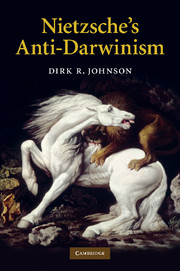Book contents
- Frontmatter
- Contents
- Acknowledgements
- Abbreviations
- Introduction
- Part I Early Darwinism to the “Anti-Darwin”
- Part II Nietzsche's Genealogy of Morals
- Chapter 4 Nietzsche's “nature”: or, whose playing field is it anyway?
- Chapter 5 The birth of morality out of the spirit of the “bad conscience”
- Chapter 6 Darwin's “science”: or, how to beat the shell game
- Conclusion
- Bibliography
- Index
Chapter 6 - Darwin's “science”: or, how to beat the shell game
Published online by Cambridge University Press: 17 November 2010
- Frontmatter
- Contents
- Acknowledgements
- Abbreviations
- Introduction
- Part I Early Darwinism to the “Anti-Darwin”
- Part II Nietzsche's Genealogy of Morals
- Chapter 4 Nietzsche's “nature”: or, whose playing field is it anyway?
- Chapter 5 The birth of morality out of the spirit of the “bad conscience”
- Chapter 6 Darwin's “science”: or, how to beat the shell game
- Conclusion
- Bibliography
- Index
Summary
GM III finalizes and radicalizes Nietzsche's anti-Darwinian critique by undermining the entire belief in the possibility, even desirability, of scientific truth. The essay does not center exclusively on science. It focuses roughly equal attention on other aspects of the “ascetic ideal” – specifically, its connections to art, philosophy, and religion. But its final exposure of the ascetic imperative behind nineteenth-century science represents the resounding climax of both the essay as well as the text as a whole. GM is a single and sustained polemic against the extension of Darwinian premises to the important study of man. Further, it argues against the inviolability of those premises as a result of their transfiguration into scientific “truth.” Nietzsche's decision to dedicate an entire work to the question of Darwinian genealogy reveals his prescience in understanding that Darwinism would represent a credible and historically influential contemporary interpretation, a “scientific” paradigm, of man and nature.
At the same time, Darwin's resounding success at the late century and beyond has obscured the historical context of Nietzsche's critique. Having occurred at the inception of the “Darwinian revolution,” his analysis suggests alternative philosophical vantage points before Darwin's biological perspective had solidified into “objective,” canonical science. By reinserting GM into its historical context, we will regain an interpretative stance easily overlooked thanks to our facile focus on Darwinian versus anti-Darwinian (i.e. Christian) forces – that is, the seductive historical narrative of a now triumphant Darwinism.
- Type
- Chapter
- Information
- Nietzsche's Anti-Darwinism , pp. 172 - 202Publisher: Cambridge University PressPrint publication year: 2010



